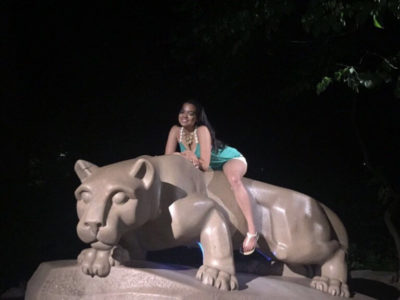Growing up, we all have this image of college. We see it in movies like Animal House, Pitch Perfect or Neighbors: crazy Greek life conspiracies, the wild parties and of course the hookups. Although these cultural myths shocked me upon starting college, I felt more than that. More specifically, I felt culture shocked. College marked the first time I felt different from my peers. People obviously tend to create strong bonds/friendships a la Friends with people they can relate to easily. But what do you do when you look around and feel like a complete outcast?
Back home (Reading, PA to be exact), fitting in was so easy. Looking out the window, I spotted several Latin American flags hanging on porches. I heard Hispanic moms conversing with neighbors and cars passing by blasting loud reggaeton. It seemed as though everyone came from the same cultural background. Most of my peers were Hispanic/Latino, but mostly Dominican or Puerto Rican (which most consider the same thing). People were like me. We spoke Spanish at home, Spanglish with our peers, danced Bachata and Merengue and ate arroz con habichuela y carne (rice, beans and meat) on the daily. Being in that community for so long almost makes you think that everyone understands and sees the world like you do.
My reality check came as soon as I stepped onto State College, home to The Pennsylvania State University. According to Public School Review, my high school had a minority enrollment of 94 percent, 80 percent of which was Hispanic/Latino. But on the other hand, Penn State has a Hispanic student enrollment of six percent. It does not take a mathematician to calculate how out of place I felt.
Wherever I went, my long dark hair and tan skin always stood out to people, and I got the “Where are you from?” question constantly. Whenever I’d reply that I came from Pennsylvania, people always asked again, “No, but where are you actually from?” I never took much offense from it, but it almost seemed as if people were emphasizing that I looked different than everyone else. I could not help but think: “Where are the people who look like me?”
The first week, I found myself very much alone in a huge school. One night on campus, I went to a free Dej Loaf concert all alone. This pattern of doing activities solo continued all week. While it seemed like everyone already formed their cliques and #squads, I was still trying to find myself and where I fit in on campus.
Coming to Penn State also marked the first time I realized I had an accent. Back home I lived surrounded by so many people who spoke like me, so I thought my English sounded perfectly normal. But when I joined a radio club, (which required us to record and listen to each other’s voices) I realized that I speak fast, roll my r’s and sometimes skip letters between words.
My professor even pointed out that people with accents in this industry will need to “fix them.” I will never feel ashamed of my Dominican-American accent, but a field like broadcast journalism almost forces me to get rid of it. This statement felt offensive. Getting rid of my accent almost feels like getting rid of who I am and where I came from. I love being bilingual, but I need to work a little harder than my peers in terms of the way I speak.
But there’s an upside. Although I feel different from everyone else, I learned more about my peers and their backgrounds. I’m able to pick up on different accents and have an idea of where different people come from, especially with Latin Americans.
Beyond that, I actually realized that I’m not alone. My roommate, a Cambodia native, once stood in my shoes too. The same micro-aggressions experienced by Latinos happens to Asians; people mistakenly categorize Asians on campus as Chinese. Once, while walking down the street, drunk men told her, “Go back to China.” I heard the hurt in her voice when she told me this story. These common experiences made our friendship stronger: We are two minorities on campus who feel constantly misunderstood.
I began to feel at home as soon as I joined a student-run club, Latino Caucus. Within the club I met fellow Dominican-Americans; it served as a huge eye-opener for me. Lo and behold, I’m not the only college student who felt culture shocked upon my arrival. Turns out, culture shock happens a lot in college, but no one ever really talks about it.



















